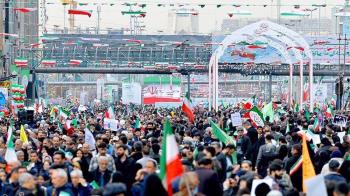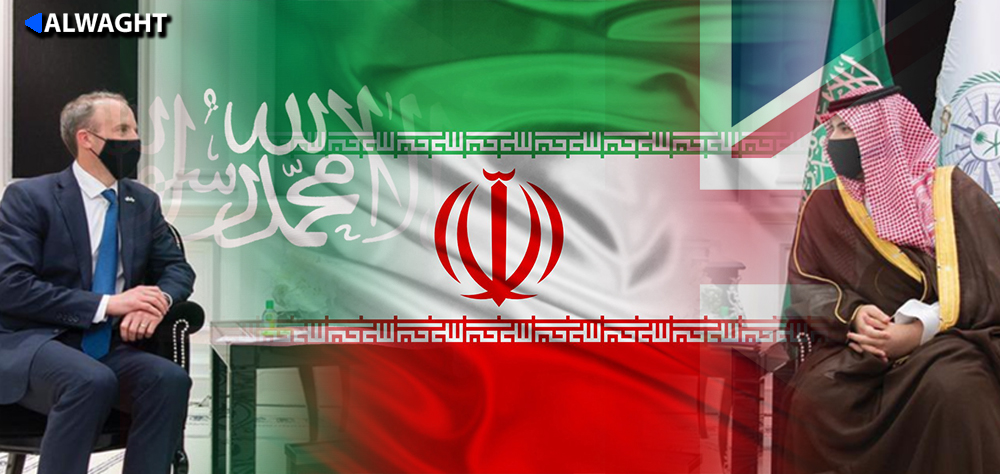Alwaght- In British Foreign Secretary's recent visit to West Asia, Iran was one of the topics of discussion between Dominic Raab and Arab authorities.
The Saudi-funded Al Arabiya news network reported that during top British diplomat's meeting with the Saudi Crown Prince Mohammed bin Salman, Raab discussed an array of issues, especially Iran.
Britain's Foreign, Commonwealth, and Development Office published a statement on the meeting, citing Secretary Raab as saying "the UK reaffirms our commitment to tackling our shared security challenges, including Iranian threats and the continued conflict in Yemen."
Iran nuclear deal on the agenda
Raab's visit to Saudi Arabia coincided with talks in Vienna, Austria, to restore the 2015 nuclear deal with Iran known as Joint Comprehensive Plan of Action (JCPOA). At the same time, some have described the British Foreign Secretary's visit as a reassurance to Saudi Arabia that London will continue to support Riyadh if an agreement is reached with Tehran.
Saudi Arabia, along with the Israeli regime, has been a staunch opponent of a nuclear deal with the Islamic Republic in recent years, and now that talks are under way in Vienna, Riyadh and Tel Aviv are increasingly concerned about the Iranian nuclear developments. Therefore, it seems that Raab, whose country is a party to the nuclear negotiations, during his visit to Saudi Arabia tried to reassure the leaders of Arab monarchy that Riyadh would enjoy West's support even when the nuclear deal, which was scrapped by the previous US President Donald Trump in May 2018, is brought back to effect.
Fueling Iranophobia
At the same time, another important matter in connection with Raab's regional tour was the Western efforts to keep burning the fire of the Iranophobia among the Arab countries.
The issue of the US withdrawal from Iraq and Afghanistan is very much on the agenda these days, and even the US administration has set a timetable for its exit from Afghanistan by September, and in Iraq the US is facing increasing pressure to pull out its troops.
Under these circumstances, it seems that the British leaders are once again trying to rebuild their foothold in the region, even after the US withdrawal from Afghanistan and perhaps Iraq, by underscoring the largely sham threat posed to the Arab countries by Iran.
Actually, the important point is that British Foreign Secretary's visit marked continuation of the Iranophobia project in the region managed by the West, and this project comes along with a security project undertaken by another Western ally in the region, the Israeli regime.
According to the Israeli national security document for 2020 and 2021, Tel Aviv intends to launch an Iranophobic project in its new regional strategy so that in addition to mobilizing the capacity of the West at its service, gain backing of the Arab monarchies— on top of them Saudi Arabia— for the final goal of sewing anti-Iranian sentiments in the region and bringing the Arab rulers to list of its allies.
Pushing to return to West Asia in vain
At the same time, it seems that London has once again dreamed of boosting its military presence in the region and returning to West Asia. This intention is motivated by the US withdrawal from the region. In late May, the First Sea Lord of the British Navy Tony Radakin said his country could dispatch the HMS Queen Elizabeth aircraft carrier to the Indian Ocean, and the Persian Gulf if necessary, for the fighter jets to support the British forces' withdrawal from Afghanistan.
If sent to the region, it will be the aircraft carrier's first mission in the region since cutting the country's military mission in Afghanistan in 2014. Such a decision will demonstrating London's determination to fill Washington's place in the region after leaving Afghanistan and perhaps Iraq.
This comes while over the past two decades, the Americans failed to bring back peace and stability to Afghanistan and Iraq and are forced to leave the two countries as they find the growing military, political, and international costs unbearable anymore. While Washington has declined to realize its goals in the region and finally is leaving without achievements, can London fill its place? The answer to this question is certainly negative.
The regional states, like Saudi Arabia, are seeking their security beyond the regional borders and mainly in alliances with the Western actors while they are ignorant of intra-regional collective security. Glaringly apparent, the Saudis can reach sustainable security through alliance with neighboring states. But currently their eyes are on their Western partners and this foreign-oriented look doubles their vulnerability in their quest for regional security and stability.



























